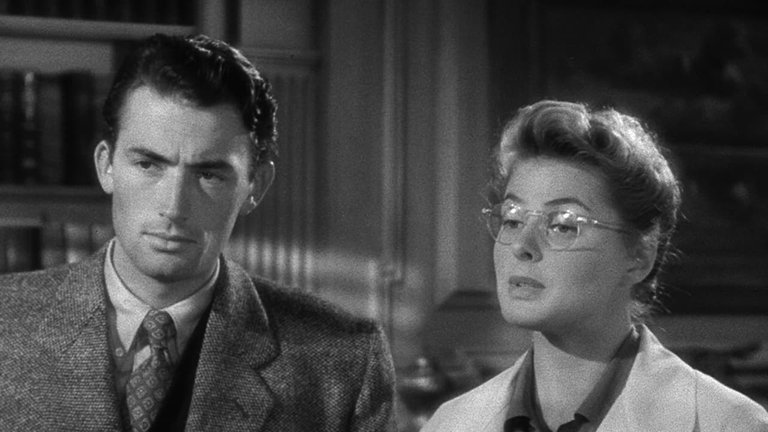
As I had said in one of my previous reviews, from time to time I'm faced with interesting movie watching phenomenon, quite opposite from "guilty pleasures". There are film authors who are great and who are supposed to be worshiped, but sometimes I just can't help it - I don't like their work and later I feel guilty about it. The movies are technically all right, they have all the necessary ingredients, but they simply don't look the way a true masterpiece should. I often encounter such phenomenon when I watch films by John Ford, but there are other cases. Among them are also classic thrillers by Alfred Hitchcock, the great master of suspense. More often than not, those alleged masterpieces failed to meet expectations created by the established critics and film scholars. Of course, that doesn't mean that they are bad or substandard; actually, many of them are very good, but their flaws are often overlooked, mostly out of irrational respect towards great Hitchcock. One of the illustrations of such phenomenon is Spellbound, his 1945 thriller, often hailed as the first major Hollywood film to deal with psychoanalysis.
The plot of the film begins in Green Manors, psychiatric institution dedicated to the treatment of mental disorders via psychoanalysis. Among the staff is Dr. Constance Petersen (played by Ingrid Bergman), beautiful but emotionally cold psychiatrist. Her barren love life is going to improve thanks to Dr. Edwards (played by Gregory Peck), young psychiatrist who is going to become new head of the institution. Two of them fall madly in love with each other, but Constance and her colleagues soon discover some oddities in Dr. Edwards' behaviour. Constance confronts him and discovers that her lover is actually an impostor, mentally disturbed amnesiac who used to be Dr. Edwards' patient and later took his identity after being involved in some mysterious and traumatic incident which, presumably, left real Dr. Edwards dead. Against her better and professional judgement, guided only by the feelings towards stranger who has initials "J.B." as the only trace of identity, Constance decides not to report him to police. Instead, she tries to treat his condition by helping him to remember his true identity and what really happened.
Hitchcock, sometimes accused of creating films solely around single scene, had a very good script here, written by Ben Hecht and based on the novel by Francis Beeding. The plot of Spellbound revolved about genuine and very intriguing crime mystery, and its originality was due to the use of someone's mental condition as the main element of the plot. Hitchcock also used that mental condition in order to create some really effective and suspenseful scenes. On the other hand, scenes that were most remembered from this movie – dream sequence by Salvador Dali and the showdown at the end – had nothing to do with such mental condition. The bravery with which Hitchcock had used psychoanalysis for the first time in Hollywood was compromised with rather simplistic approach towards such subject. According to Hitchcock, psychological problems that require professional help could be cured simply if person acknowledges their existence. Of course, we know that this is not the case, and even Hitchcock in his later films used much more complex approach when he dealt with psychoanalysis.
The acting in this film is good. Ingrid Bergman is very believable, both as emotionally detached professional and as woman blinded by love. Unfortunately, her character is done great disservice with the script that failed to properly explain her transformation from former into latter; Hitchcock as director didn't help either, since he didn't make that change gradual. Also, many feminists would probably be up in arms because this film implicitly treats professional women as inherently unstable and therefore inferior to their male colleagues. Gregory Peck as her partner has somewhat better role that inspired many similar characters in psychological thrillers - good looking guys who hide sinister secrets behind their attractive surface. But, those who played supporting roles did the most impressive acting job in Spellbound. Michael Checkov was excellent as Dr. Brulov, old mentor and friend of Constance. Leo G. Carroll was also very good as Dr. Murchison and Bill Goodwin had a brief but very good appearance as sympathetic house detective.
All in all, Spellbound is more than solid, although still overrated psychological thriller. Its true importance lies not in its quality, but in the roads Hitchcock paved for future filmmakers with it.
RATING: 7/10 (+++)
(Note: The text in its original form was posted in Usenet newsgroup rec.arts.movies.reviews on November 26th 1999)
Blog in Croatian https://draxblog.com
Blog in English https://draxreview.wordpress.com/
Cent profile https://beta.cent.co/@drax
Minds profile https://www.minds.com/drax_rp_nc
Brave browser: https://brave.com/dra011
BTC donations: 1EWxiMiP6iiG9rger3NuUSd6HByaxQWafG
ETH donations: 0xB305F144323b99e6f8b1d66f5D7DE78B498C32A7
Movie URL: https://www.themoviedb.org/movie/4174-spellbound
Critic: AA